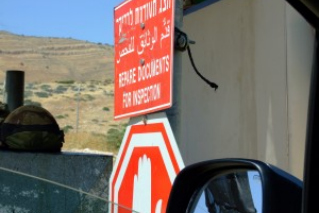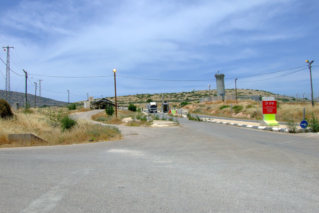 Tayasir Checkpoint. Photo by Noam Aram
Tayasir Checkpoint. Photo by Noam AramACRI’s Action-A-Day project provides the Israeli public with accessible, simple ways – one per day – to help promote the rights of Palestinians in the West Bank. Since its inception, Action-a-Day has been a tremendous success, with widespread participation and interest.
Last week, ACRI launched the all new season of Action-A-Day. This time, the focus is on the Jordan Valley: the water supply to al-‘Ouja, the restrictions on freedom of movement between different areas of the Jordan Valley, and other violations of the most basic human rights of the local residents. The Action-A-Day campaign for the Jordan Valley is run in partnership with B’Tselem, Bimkom – Planners for Planning Rights, and Friends of the Earth – Middle East (FoEME).
Upon the launch of the new campaign, we want to share with you a text written by Noa Rivlin, the Coordinator of ACRI’s International Humanitarian Law Project, describing her personal experience with just a few hours of movement restrictions – the kind of restrictions that the residents of the Jordan Valley experience on a daily basis. The text was originally published in Hebrew on ACRI’s Action-A-Day website.
Now we begin. We start taking one action a day for the people of the Jordan Valley. Want to join us? Write to action@acri.org.il
The Human Rights (of) Movement / Noa Rivlin
Ten minutes, and then ten more minutes in the sun. And half an hour passes by. And an hour. In the fatigue caused by the lengthy wait, when we were already staring into space in complete apathy, we finally understood the meaning of the term “movement restrictions.”
The Tayasir Checkpoint is one of the four checkpoints that separate the Jordan Valley from the rest of the West Bank. Yesterday, we had to pass through this checkpoint in order to get to a meeting in the Palestinian village al-‘Aqaba, a 5 minute drive from there. We went through 2 hours of helplessness and burning sun. Wishing to continue with our daily routine, but stuck, controlled by a force that is greater than us. This is what the amorphous and distant term, “movement restrictions,” does to you: it turns you from a human being to a helpless, exhausted and furious creature. Freedom of movement is a basic right. Without it, it is impossible to sustain the fabric of life.
What we got was only a small taste of it. We were stuck there, but we knew that in the evening we will head back home to our protected and undisturbed lives. And we knew that an Israeli attorney was making phone calls on our behalf, on the other side of the Green Line. Our livelihood did not depend on crossing the checkpoint, nor our ability to get medical treatment or an education. So our feelings of fear and anger upon the encounter with the soldiers in the checkpoint (some of them even tried to be helpful) were much less acute than what Palestinians must feel in a similar situation.
Ten minutes pass, and then ten minutes more, another attempt to make a phone call or to talk to the soldiers to see where things are and who needs to give an order to whom so we can cross. Waiting for some higher-up, somewhere in the chain of command, to say the words that would let us through.
Palestinians who want to move through the Jordan Valley usually manage somehow; it just makes things more complicated and much more expensive. When the car of the al-‘Aqaba local council can’t pass the checkpoint in order to bring fabric to the local sewing workshop, they pay another driver to bring the merchandise from the other side of the checkpoint. Girls from the village of Bardala, who go to high school in Tubas, a nearby town, change cars in the checkpoint. And a family from Tayasir, on its way to visit relatives in al-‘Ouja, gets off the car and goes through security checks, including the little children and the baby.
And this is not a checkpoint at the entrance to Israel; this is an internal checkpoint, between two areas of the Occupied Territories. Furthermore, it is very easy to enter the Jordan Valley from other roads. The “security logic” behind this completely escapes us.
- For more information on human rights violations in the Jordan Valley, check out the new B’Tselem report, “Dispossession and Exploitation”
—–
Update, August 2011: The Action-A-Day campaign for the Jordan Valley has come to an end, and the team bids farewell in a letter dedicated to “you, the people who did not give up.”









Pingback: Over 1,180 Palestinians displaced and affected by Israeli demolitions in the West Bank so far in 2011
Pingback: Most Israelis don’t see Jordan Valley as occupied
Pingback: Most Israelis don’t see Jordan Valley as occupied | Eseaf